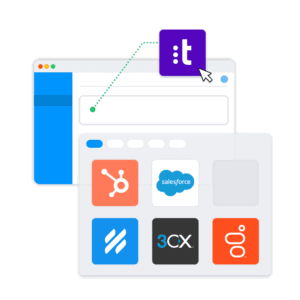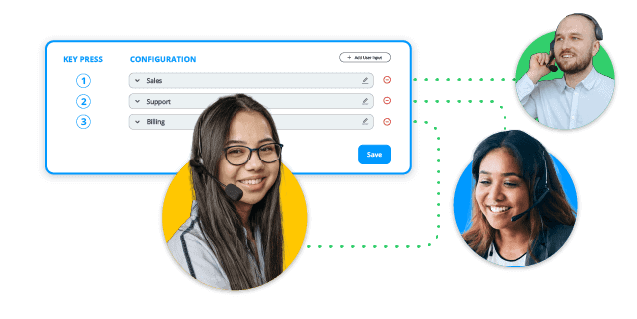Call Queue Software
Call Queue Software
Improve your callers’ customer experience with call queue software and take advantage of queue callback, IVR routing, voicemail transcription, and much more to enhance your caller interactions.
Call Queue Phone System
Call queue software provides an easy way to increase agent productivity by organizing, filtering, and formally grouping your teams. Customize ring strategies for each team you create to ensure calls are efficiently distributed so your callers get support quickly. AVOXI makes it easy to customize your phone queues, monitor your calls, and manage your agents. Automate workflows even further when you integrate your call center queue management software with your CRM and other business tools.
Manage Your Call Queue System Online
Configure your call queue system online in just a few clicks. Create custom hold music or personalized messaging while callers wait, and set up timeout limits to determine how long your callers wait before being directed to voicemail.
Reduce Missed and
Abandoned Calls
Use custom ringing strategies for your call queues such as round-robin, least used, or ring all to route callers. When a queue is full, reduce abandoned calls by allowing your customers to receive a call once an agent is available.
Easily Monitor Team Activity
Measure performance and the impact that call queue software has on your business from one dashboard. View live queue metrics like average wait time and callers on hold, and use historical queue reports to optimize agent scheduling.
Setting Up Your Phone Queue System is Easy and Affordable
Measure team performance and the impact a call queue phone system has on your business.
Queue Dashboard
See how many agents are available, on calls, how many calls are waiting, average wait time, and maximum wait time.
Agent Management
View agent statuses and the call queues they are in, and manage and coach your agents with live call monitoring.
Call Queue Management
Easily manage your inbound calls with custom routing, hold music, and IVR prompts.
Phone Queue Call Back
Enterprise license users can reduce abandoned calls and enhance callers’ queuing experience by offering callers the options to get a call back once an agent is available.
Integrated with the Technologies
Your Business Relies On
Streamline your workflow and stay connected with AVOXI's integrations.

Integrated with the Technologies
Your Business Relies On
Streamline your workflow and stay connected with AVOXI's integrations.
Common Questions About Call Center Queue Management
Is there a limit on how many call queues I can set up with my phone queue system?
Will your call queue system work with my current phone system?
How do you set up call queues with AVOXI?
How much does call queue software cost?
Is Queue Callback included with my phone queue system?
Still Have Questions About Call Center Queue Management?
We are here to help! Get a demo or try a free trial and see what our call queue system can do for you.
Call Queuing
Welcome to AVOXI's comprehensive guide to call queuing, where our goal is to inform and guide readers on the benefits and usage of call queuing management solutions. In this article, we will provide a detailed overview of call queuing, emphasizing its importance in streamlining business operations, and showcase how AVOXI's innovative software can help businesses effectively manage call queues.
In this guide, we will delve into the concept of call queuing management and its significant impact on both businesses and customers. By effectively managing call queues, businesses can greatly improve customer satisfaction and optimize their operational efficiency. We will explore the benefits of call queuing, such as reducing abandoned calls, increasing agent productivity, and ensuring a fair and organized call handling process. Furthermore, we will explain how AVOXI's call management solutions, tailored to meet the unique needs of businesses, can assist in achieving these desirable outcomes. Our software provides advanced features like intelligent routing, real-time queue monitoring, and customizable options to help businesses streamline their call queuing processes.
What Is Call Queuing?
Call queuing is a telecommunication process that manages incoming calls when all agents in a call center are busy or unavailable. When the call center experiences a high volume of calls, call queuing places incoming callers in a virtual waiting line until an agent becomes available to handle their call. During this time, callers may hear recorded messages, music, or informative prompts to inform them of their position in the queue or provide updates about expected wait times. Call queuing ensures efficient call handling, reduces call abandonment rates, and allows businesses to handle peak call periods effectively, leading to improved customer satisfaction and a more organized call center environment.
Understanding Call Queuing: Making the Most of Phone Systems
Call queuing is a prevalent practice across various industries, facilitating efficient call management and enhancing customer experiences. Let's explore some real-life examples of call queuing in different sectors:
- Telecom Industry: Telecom companies often experience a surge in customer calls, especially during promotional offers or service disruptions. Call queuing ensures that customers are placed in a waiting queue until a representative is available to address their inquiries about billing, technical issues, or new service subscriptions.
- Healthcare Sector: Hospitals and clinics use call queuing to handle a high volume of patient calls. Patients seeking medical appointments, prescription refills, or general health-related information are placed in queues to speak with the next available nurse or receptionist.
- E-commerce and Customer Support: Online retailers with busy customer support lines utilize call queuing to manage inquiries regarding orders, returns, and product information. Callers are kept informed about their waiting time and are directed to the most suitable customer support representative for efficient assistance.
- Travel and Hospitality: Airlines, travel agencies, and hotels often experience call spikes during peak booking seasons or in the event of travel disruptions. Call queuing ensures that travelers receive the necessary support and booking assistance, reducing frustration during busy periods.
- Financial Services: Banks and financial institutions deploy call queuing to handle customer inquiries regarding transactions, account balances, and loan applications. This helps manage fluctuations in call volume and ensures customers are promptly connected to a skilled agent.
- Government and Public Services: Government agencies often face increased call traffic, especially during tax season or when rolling out new policies. Call queuing allows citizens to get their questions answered by the appropriate department, improving the overall efficiency of public service operations.
These real-life examples illustrate how call queuing enables businesses and organizations to handle high call volumes effectively, enhancing customer satisfaction and optimizing operational performance across diverse industries.
Call Queuing Software
When picking a call queuing software, look for intelligent call routing based on agent availability and skills, customizable greetings and announcements to enhance customer experience, real-time monitoring for performance insights, seamless integration, and scalability to meet your business needs. Prioritize user-friendliness and features that optimize call center efficiency and customer satisfaction.
Call queuing is a vital aspect of call centers and businesses that handle high call volumes. A call queue system, facilitated by call queue software, manages incoming calls by placing them in a queue until an available agent can attend to them. To improve call queue wait times for call centers, several strategies can be implemented. Firstly, efficient call queue management involves monitoring call queue analytics and queue call logs regularly. Analyzing data such as average wait times, call abandonment rates, and peak call hours helps identify patterns and areas for improvement. Setting key performance indicators (KPIs) related to call queuing, such as average wait time and first call resolution rate, can help track and optimize call center performance. Implementing skill-based routing in the call queue system ensures callers are connected to agents with the right expertise to resolve their queries quickly, leading to improved customer satisfaction.
Secondly, investing in call queue software with advanced features can significantly impact call queue wait times. Call-back options can be integrated into the system, giving callers the option to receive a callback from an agent instead of waiting on hold. This not only reduces perceived wait times but also allows agents to prioritize their responses and offer a more personalized experience. Additionally, leveraging interactive voice response (IVR) technology can help filter and resolve simple queries automatically, minimizing the need for callers to wait for an agent. Overall, optimizing call queue management and employing the right tools and analytics not only reduces wait times but also enhances the overall efficiency and performance of call centers.
Call queuing for businesses, especially in call centers, can be efficiently managed through the implementation of call queue software and strategies to improve call queue wait times. Analyzing call queue data, setting relevant KPIs, and utilizing skill-based routing contribute to a streamlined and customer-centric call handling process. By integrating call-back options and IVR technology, businesses can enhance the caller experience and reduce frustration associated with long wait times. Effective call queuing not only benefits customers by providing quicker resolutions but also positively impacts agent productivity and overall call center performance.
Unlocking the Potential: AVOXI's Call Queuing Software for Businesses
AVOXI's call queuing software revolutionizes call management and operations for businesses, offering a wide array of unique features and benefits that enhance customer interactions and optimize call center efficiency. With intelligent call routing based on agent availability, AVOXI ensures that calls are automatically directed to available agents, reducing wait times and ensuring prompt customer assistance. Skill-based routing further enhances this process by matching callers with agents possessing the relevant expertise, leading to personalized and efficient resolutions.
One standout feature of AVOXI's call queuing software is its customizable greetings and announcements. Businesses can create tailored messages to keep callers informed about their queue position, estimated wait times, and provide essential information during peak call periods. This transparency and communication contribute to a positive customer experience, reducing caller frustration and building trust with the brand.
AVOXI's software also enables real-time monitoring and reporting, empowering supervisors to gain valuable insights into call metrics and agent performance. By analyzing this data, businesses can identify areas for improvement, make data-driven decisions, and optimize call center operations for enhanced productivity.
AVOXI's call queuing software is user-friendly and scalable, making it suitable for businesses of all sizes. With seamless integration and advanced features, AVOXI's solution ensures efficient call handling, improved customer interactions, and increased customer satisfaction. Ultimately, AVOXI's call queuing software sets a new standard for call center performance, helping businesses provide exceptional service and achieve success in today's competitive market. Explore the power of call queuing with AVOXI today!

